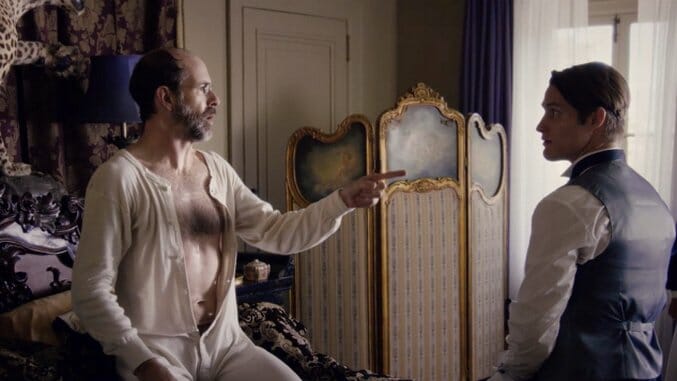
Last year on Comedy Central’s Another Period, Victor (Brian Huskey) sat at the sickbed of his lover Albert (David Wain), who was unconscious and on the brink of death. Victor tells him, “No one will ever replace you.” Immediately afterward, handsome Dr. Goldberg (Moshe Kasher) enters and Victor tells him, “My name is Victor and I’m incredibly vulnerable right now.” Dr. Goldberg smiles back at him seductively and says, “Let the healing begin.” It’s funny, but it’s also an intimate scene all about same-sex relationships. The humor of the scene doesn’t detract from Victor and Dr. Goldberg’s genuine attraction or make a joke out of the fact that they’re gay.
For too long, comedy only used gay and bisexual characters and relationships for gross out humor. In the advent of shows like Another Period and Archer, we get to see another side of non-hetero relationships: we’re just as gross and petty as everyone else.
The Archer episode where Lana Kane decided to have sex with Pam Poovey was strikingly refreshing in its simplicity. Instead of an episode that draws from the titillation of sexual experimentation or the stigma of same-sex attraction, it’s a character-driven story where Lana just decides to have pity sex with her less attractive friend. It’s one of the most true-to-life depictions of sexual experimentation I’ve seen. Sure, I love teen dramas and primetime soaps, but irreverent comedies are a great and unappreciated source for non-formulaic gay and bisexual characters.
Turning to comedy in order to see same-sex intimacy is nothing new for me. Things have changed a lot now that we have Netflix Instant and niche LGBT films, but, when I was discovering my sexuality, edgy comedy was the one place I could turn for scenes where same-sex couples were overtly intimate. In a 2000 episode of South Park, Saddam Hussein tried to seduce Satan by rubbing against him and presenting him with dildos. Meanwhile, on Will & Grace, there were almost never scenes of Will kissing one of his boyfriends or even sitting in bed with another man and talking.
However, scenes between two men on shows like South Park were essentially gross-out humor. In a lot of comedy from the early 2000s, showing two men together was a gag on par with seeing someone get peed on. Because I don’t feel respected by edgy comedy, my relationship to it is grateful, but ambivalent.
In recent works, it’s less common to use gay acts for gross-out humor, but invoking the idea of same-sex attraction as a punchline is still a staple. Look at Silicon Valley, which has an episode where two different plotlines revolved around hilariously implying that two men might have feelings for each other. In this episode, someone overhears Jared talking about how Richard is his “partner.” He’s referring to the fact that they run a business together, but the listener misunderstands and hilarity ensues. At the same time, Dinesh says he’s attracted to a woman because of a code she wrote, only to find out it was actually written by his male co-worker Gilfoyle. Dinesh is deeply disturbed. This episode was a reminder that even now a sitcom can have a punchline that boils down to “wouldn’t it be funny if men were attracted to each other.”
My ambivalence towards edgy comedy is what makes it inspiring to see other comedies flip this on its head and use the formula that has always been there for a genuine portrayal. Archer and Another Period capitalize on the fact that we’re used to seeing same-sex attraction invoked in raunchy comedy. They make sure that what makes the scene raunchy comes from who these characters are, rather than their sexuality. Usually two men making out is the entire punchline, but Another Period gives us a scene where two men are making out and the punchline is that Victor is cheating on Albert right on top of Albert’s unconscious body. It’s not only less isolating to gay viewers, it’s much funnier.
These shows also avoid one of the most common excuses people use to criticize the presence of gay and bisexual characters: the idea that it will be “preachy.” People are quick to go to this standby and pretend that the mere existence of characters who aren’t straight immediately makes something a lecture on issues. But it’s impossible to make such a complaint when we’re watching something like Archer’s Ray Gillette talk about getting revenge on a man who led him on by getting him drafted into war. (“Now who’s laughing, Mr. Hooks For Hands?”)
Modern Family’s “they’re just like other families” narrative is great, but don’t overlook the importance of shows where gay and bisexual characters get to be genuinely disgusting and nasty. Archer and Another Period show us that there is room for characters who aren’t straight in edgy comedy without them being used as one-dimensional gags.
Lenny Burnham is a writer and comedian based in New York City. Follow him on Twitter here.